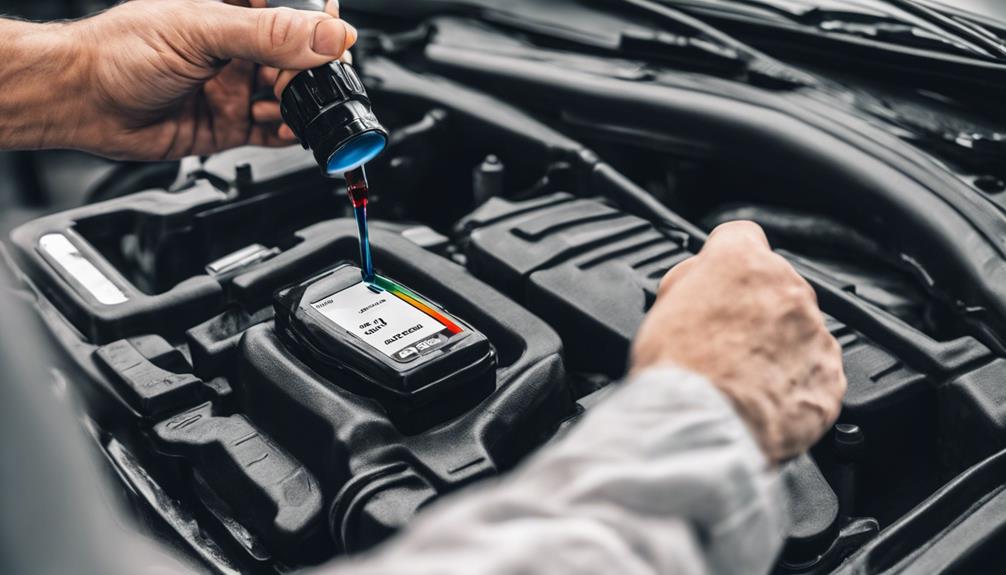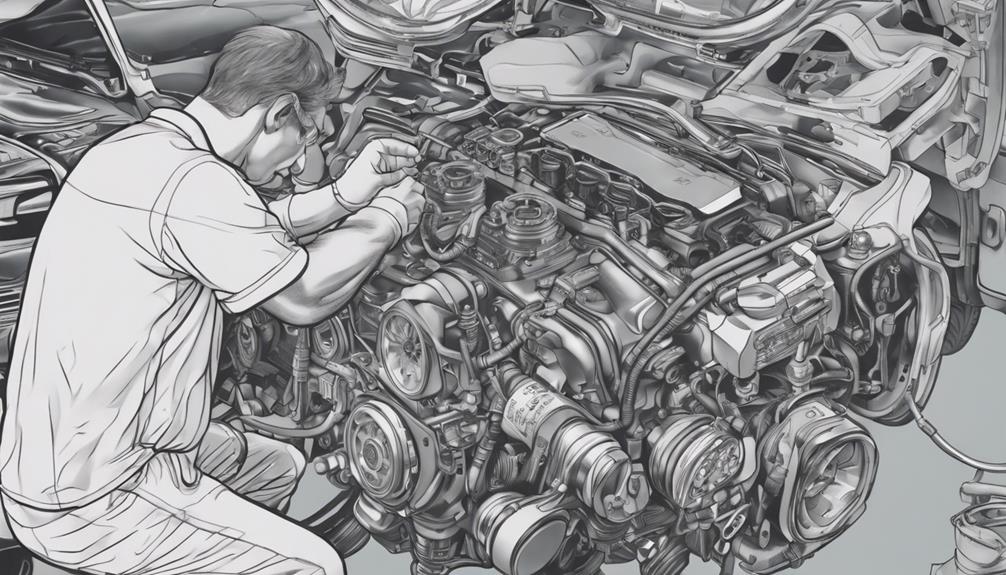If you're experiencing transmission problems with your BMW 650i, such as rough shifting, jolts in automatic models, or unusual noises during gear changes, it may indicate underlying issues. Signs like delayed gear shifts, slipping, or jerking while driving should prompt immediate attention. Regular maintenance practices are crucial for maintaining transmission health, including addressing warning lights or unusual symptoms. Plaza BMW provides free diagnosis by experienced mechanics, emphasizing the significance of regular fluid changes and proactive maintenance to ensure smooth driving experiences and prolonged vehicle performance.
Understanding these common issues can help you address transmission concerns promptly. By being proactive and addressing problems early, you can maintain the performance of your BMW 650i and avoid more significant issues down the road.
Key Takeaways
- Regular maintenance prevents transmission issues.
- Promptly address warning lights for safety.
- Seek professional help for diagnostics and repairs.
- Use specialized tools for accurate diagnosis.
- Opt for genuine BMW fluids and filters.
Common Transmission Issues in BMW 650i

Experiencing rough shifting between gears is a common concern found in BMW 650i transmission issues, particularly in models with automatic transmission systems. This problem can manifest as a jolt or hesitation when changing gears, indicating underlying transmission issues. When driving your BMW 650i, if you notice unusual noises accompanying gear shifts, it could be a sign of automatic transmission problems. These noises may include grinding, whining, or clunking sounds, signaling potential issues that need attention.
Another common symptom to be aware of is delayed or hesitant gear changes in your BMW 650i. When your vehicle takes longer than usual to shift gears or seems to struggle before engaging, it may point towards automatic transmission concerns. Additionally, transmission slipping or jerking while driving is a red flag for potential transmission issues in the BMW 650i. If you experience instances where the transmission seems to slip out of gear or the vehicle jerks unexpectedly, it's vital to have it inspected promptly to prevent further damage.
Signs of Transmission Problems
If you notice your BMW 650i experiencing rough shifts between gears, this could be a sign of transmission problems. Unusual noises during gear changes should also be taken seriously as they may indicate underlying transmission issues.
Delayed or hesitant gear shifts are common symptoms that shouldn't be overlooked and may require preventative maintenance to avoid further transmission complications.
Common Symptoms
Frequently experiencing rough shifting between gears is a common indication of transmission problems in the BMW 650i. When dealing with transmission issues, it's important to be aware of the following symptoms:
- Unusual Noises: Hearing strange sounds during gear shifts, like clunking or whining, can signal underlying transmission problems.
- Delayed Gear Changes: If you notice delays or hesitations when shifting gears, it could be a sign of a malfunctioning transmission in your BMW 650i.
- Transmission Slipping or Jerking: Experiencing slipping or jerking movements while driving, especially when changing gears, is a red flag that shouldn't be ignored.
Being attentive to these symptoms can help you address potential transmission issues promptly and prevent further damage.
Preventative Maintenance
Regular maintenance practices are vital in detecting early signs of transmission problems to ensure peak performance and longevity of your BMW 650i. Regular transmission fluid changes every 30,000 miles are essential to prevent slipping and maintain proper cooling and lubrication.
Signs of transmission issues include delayed shifting, unusual noises during gear changes, leaking fluid, burning smells, and dashboard warning lights. Remember, different fluids are required for automatic and manual transmissions due to varying viscosity and lubrication needs.
Prompt attention to unusual smells, fluid leaks, warning lights, delayed gear shifts, and uncommon noises can help diagnose potential transmission problems early on. Plaza BMW offers free diagnosis by factory-trained mechanics for customers experiencing transmission concerns, ensuring your vehicle receives the necessary care.
Diagnostic Steps for Transmission Troubles

To effectively diagnose transmission troubles in your BMW 650i, start by performing a thorough diagnostic scan using specialized BMW tools to identify any potential fault codes. Once you have completed the initial scan, follow these steps to further investigate the issues:
- Inspect Transmission Fluid: Check the fluid level, color, and condition to assess if it's due for a change. Clean and adequate fluid is essential for proper transmission function.
- Road Test Observation: Conduct a road test to monitor shifting behavior, look out for slippage, and listen for any unusual noises during gear changes. This hands-on approach can reveal underlying problems.
- Leak Detection: Examine the transmission components for any signs of leaks. Leaks can indicate damaged seals or gaskets, which may require attention to prevent further issues.
Understanding Transmission Warning Lights
When a transmission warning light illuminates on your BMW 650i, it signifies important transmission issues that require immediate attention.
These warning lights, such as 'GEAR,' 'TRANS,' or 'Transmission Error,' serve as vital indicators of underlying problems.
Ignoring these warnings can result in more severe damage and compromise your safety on the road.
Warning Light Meaning
Understanding transmission warning lights on your BMW 650i is important for promptly identifying potential issues with the vehicle's transmission system. When the transmission warning light illuminates, it's essential to decode its message. Here's what different warning lights may indicate:
- Check Engine Light: This light can signal various transmission problems like faulty sensors, damaged catalytic converter, or transmission issues.
- Transmission Temperature Warning: This light indicates that the transmission fluid is overheating, potentially due to heavy loads or driving in extreme conditions.
- Fluid Level Warning: If this light comes on, it may suggest low transmission fluid levels, which can lead to inadequate lubrication and potential damage to the transmission components.
Response and Action
Upon detecting the transmission warning light on your BMW 650i, immediate attention and action are essential to address potential transmission issues efficiently. The transmission warning light serves as an indicator of underlying problems within the transmission system.
Ignoring this warning can escalate minor issues into severe transmission complications. To safeguard your BMW 650i transmission, it's vital to promptly seek assistance from a qualified BMW specialist. By addressing the warning light promptly, you can prevent further damage and costly repairs.
Diagnostic Tools Available
Diagnostic tools play an important role in accurately interpreting transmission warning lights in your BMW 650i. When faced with a transmission issue, these tools are essential for pinpointing the root cause effectively.
Here's how diagnostic tools can assist you:
- Identifying Specific Problems: Diagnostic tools help in pinpointing issues such as low fluid levels or sensor malfunctions promptly.
- Timely Diagnosis: Understanding transmission warning lights with diagnostic tools enables timely identification and resolution of potential problems.
- Detailed Information: These tools provide technicians with detailed information for precise troubleshooting, ensuring efficient repairs.
Importance of Regular Transmission Maintenance
For peak performance and longevity of your BMW 650i, maintaining your transmission regularly is a critical practice. Regular transmission maintenance, such as fluid changes every 30,000 miles, plays a crucial role in preventing slipping, guaranteeing proper cooling, and lubrication. By staying on top of maintenance schedules, you can enhance fuel efficiency, extend your transmission's lifespan, reduce breakdown risks, enhance driving performance, and maintain your vehicle's value. Signs such as delayed shifting, unusual noises, leaking fluid, burning smells, and dashboard warning lights indicate the need for maintenance. Using the correct fluid for your specific transmission type (automatic or manual) to meet viscosity and lubrication requirements is necessary. Plaza BMW offers various transmission fluid specials and expert service advisors to assist in maintaining the right fluid levels and explain the benefits of regular maintenance.
| Benefits of Regular Transmission Maintenance | ||
|---|---|---|
| Prevents slipping and ensures proper cooling | Improves fuel efficiency | Extends transmission lifespan |
| Reduces breakdown risks and enhances performance | Maintains vehicle value | Guides on correct fluid usage |
Impact of Transmission Problems on Performance

Experiencing transmission problems in your BMW 650i can have a substantial impact on your vehicle's performance. Issues like rough shifting and gear slippage can lead to decreased power delivery and fuel efficiency, affecting your driving experience.
Neglecting these problems may not only result in costly repairs but also pose safety concerns on the road.
Performance Degradation Effects
Transmission issues in the BMW 650i can greatly affect its performance, impacting acceleration and overall power output. When facing problems with the transmission, you may experience:
- Slower response times during acceleration, hampering your ability to quickly reach desired speeds.
- Reduced efficiency due to gear shifting issues, leading to a less smooth and seamless driving experience.
- Limp mode activation, which severely limits the car's performance capabilities, affecting the agility and responsiveness of the BMW 650i.
Ignoring these transmission faults can result in decreased fuel efficiency and compromised engine performance, diminishing the overall driving experience and handling of your BMW 650i.
Safety Concerns Arise
Amidst transmission problems in a BMW 650i, the integrity of your driving safety becomes a critical concern. When facing transmission failure, vital aspects like delayed gear shifts and slipping transmissions can compromise your vehicle control and handling on the road.
The risks escalate when the transmission fails to engage gears properly, impacting acceleration and braking capabilities. A malfunctioning transmission introduces unpredictability, jeopardizing your ability to maneuver the vehicle safely.
Addressing these issues promptly is essential to maintain peak performance and guarantee safe driving conditions. Stay vigilant and proactive in resolving transmission problems to uphold your safety and that of others on the road.
Costly Repairs Needed
Costing over $3,500, the necessity for expensive repairs due to BMW 650i transmission problems significantly impacts the vehicle's performance and driving experience. When faced with transmission issues, seeking professional assistance at a service center is essential to address the following:
- Performance Degradation: Without prompt repairs, the transmission problems can lead to jerky movements and delays in gear shifting, affecting the overall driving experience.
- Increased Risk: Ignoring the need for repairs may escalate the problem, potentially causing severe engine damage and compromising safety on the road.
- Long-Term Savings: While the initial repair cost may seem high, addressing transmission issues promptly can prevent more extensive and costly repairs down the line.
Visit a trusted service center for a thorough diagnosis and effective resolution of these expensive transmission concerns.
Transmission Repair Vs. Replacement

When deciding between repairing or replacing a BMW 650i transmission, it's essential to assess the extent of damage and the overall transmission condition to make a cost-effective choice.
Transmission repair may involve addressing specific components like the valve body or solenoids, which can be a more affordable option than a full replacement. If the transmission has severe damage or internal failures that can't be fixed economically, replacement becomes necessary.
Rebuilding the transmission, which includes disassembling, inspecting, and replacing worn parts, can also be a cost-effective alternative to full replacement. The cost of repair is generally lower than replacement, but the decision should be based on a thorough evaluation of the damage and the transmission's overall state.
Professional diagnosis is pivotal in determining whether repair or replacement is the best course of action for addressing BMW 650i transmission problems. Make sure to contemplate these factors when deciding the best route for your BMW 650i's transmission.
Professional Transmission Inspection Process
Transitioning smoothly from the discussion on transmission repair options, an essential step in addressing BMW 650i transmission issues is undergoing a professional inspection process. During this examination, specialized tools and diagnostic equipment are utilized to meticulously examine the transmission system components.
Here's what you can expect during a professional transmission inspection:
- Trained technicians will carefully evaluate the transmission fluid's state and level to guarantee top performance.
- The inspection process includes thorough testing for leaks, unusual noises, and abnormal vibrations within the transmission.
- A thorough inspection helps in early identification of potential problems, allowing for timely repairs to prevent further damage.
DIY Transmission Problem Diagnostics

To effectively diagnose transmission problems on your BMW 650i, begin by conducting a visual inspection of the transmission for leaks, damage, or loose components. Additionally, use a diagnostic scanner to retrieve error codes related to the transmission system. Check the transmission fluid level, color, and smell to assess its condition and potential issues. Perform a road test to observe any abnormal shifting, slipping, or noise during gear changes. Inspect the transmission mount and linkage for wear or damage that could affect transmission performance.
| Transmission Problem Diagnostics | Description |
|---|---|
| Visual Inspection | Check for leaks, damage, or loose parts |
| Error Code Retrieval | Use a diagnostic scanner |
| Fluid Check | Assess level, color, and smell |
| Road Test | Monitor shifting, slipping, and noise |
If your BMW 650i goes into limp mode, where the transmission operates in a restricted capacity, these diagnostic steps can help you identify potential issues promptly.
Preventive Measures for Transmission Health
If you aim to maintain peak transmission health for your BMW 650i, implementing preventive measures is key to ensuring longevity and smooth operation of your vehicle's transmission system. Taking care of your transmission fluid is vital in this process.
Here are three essential preventive measures to keep your transmission in top condition:
- Regular Transmission Fluid Changes: Schedule fluid changes every 30,000 miles to prevent slipping, maintain proper cooling, and ensure lubrication is at best levels.
- Use Genuine BMW Transmission Fluid: Opt for genuine BMW transmission fluid to guarantee best performance, prevent damage, and adhere to the vehicle's engineering standards.
- Replace Transmission Filter: Change the transmission filter every 30,000 to 50,000 miles to maintain transmission health by replacing critical components like the filter, gasket, and seal.
Transmission Fluid Types and Recommendations

Considering the specific transmission fluid requirements for the BMW 650i, selecting the appropriate ATF-1 or equivalent fluid is essential for top performance and longevity of the transmission system. Using the correct transmission fluid type is vital to prevent issues like damage, slippage, and overheating in your BMW 650i.
Regularly checking and maintaining the transmission fluid level and quality is key to avoiding erratic shifting or transmission failure. BMW recommends changing the transmission fluid every 50,000 miles for the 650i model to guarantee smooth gear shifts and overall transmission health.
Cost-Effective Solutions for Transmission Repairs
How can Plaza BMW's transmission repair services offer a cost-effective solution for addressing BMW 650i transmission problems?
Plaza BMW provides affordable transmission repair services that can help BMW 650i owners save money and prevent more significant issues in the future. Here's how their services can be a cost-effective solution:
- Fluid Changes and Flushes: By opting for regular fluid changes and flushes, Plaza BMW helps maintain the health of your transmission system, potentially avoiding costly repairs down the line.
- Competitive Service Rates: Plaza BMW offers competitive rates for their transmission repair services, making it a budget-friendly option for addressing BMW 650i transmission problems.
- Discounts on Transmission Parts: Additionally, Plaza BMW provides discounts on transmission parts, further reducing the overall cost of repairs and ensuring that customers get quality service without breaking the bank.
Frequently Asked Questions
How Do I Know if My BMW Transmission Is Bad?
To know if your BMW transmission is bad, watch for signs like rough shifting, delayed gear changes, or weird noises. Look out for slipping, jerking, or struggles engaging gears. Monitor the dashboard for warnings.
How Do I Reset My BMW Transmission Malfunction?
To reset your BMW transmission malfunction, try a manual reset by turning off and restarting the car. Another method is disconnecting the battery for 30 minutes. Use BMW diagnostic tools like INPA or ISTA for accurate resets.
What Is the Transmission Problem on the BMW Series 5?
When driving a BMW 5 Series, you might encounter transmission problems like rough shifting, unusual noises, delayed gear changes, slipping, jerking, or difficulty engaging gears. These signs could indicate potential transmission issues that need attention.
What Transmission Does BMW 650i Have?
The BMW 650i is equipped with the ZF 8HP 8-speed automatic transmission. This transmission is renowned for its smooth gear shifts, enhancing your driving experience. It strikes a balance between sporty performance and comfort, efficiently handling the engine's power.
Conclusion
To sum up, being proactive and attentive to the signs of transmission problems in your BMW 650i can save you time, money, and hassle in the long run.
By understanding common issues, performing regular maintenance, and addressing any warning lights promptly, you can guarantee the health and longevity of your vehicle's transmission.
Remember to always use the recommended transmission fluid and seek cost-effective solutions for any repairs needed to keep your BMW running smoothly.








